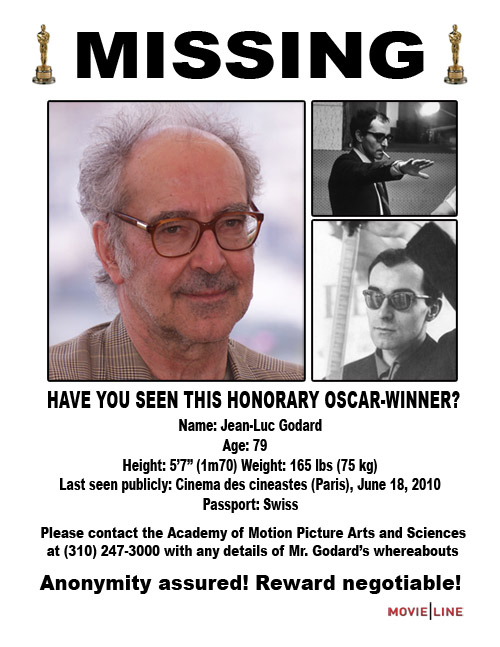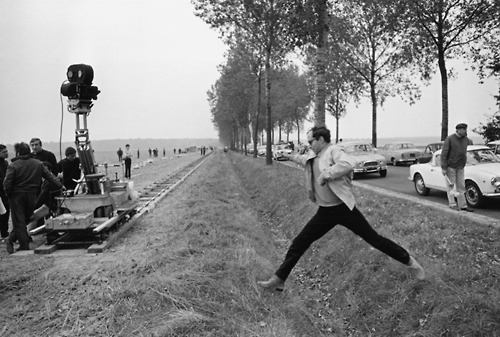Jean-Luc Godard celebrated his 81st birthday on Saturday, December 3. Last year, for his 80th, he got a font. This year, the Internet rather quietly (and capitalistically) observed the occasion: Criterion’s Facebook feed sent me to their summary page. The New York Times reviewed Histoire(s) du Cinema, and alerted me to its US DVD release on this Tuesday (Dec 6). Theaters announced special screenings. Assorted cinephile bloggers wished him well, of course, with the expected “best Godard films” lists and links to clips, my favorite of which was this short film entitled “Meeting Woody Allen”, which I’d not known about previously.
Here at HU, he gets a roundtable. Bon Anniversaire!
Godard is, perhaps more than any other filmmaker besides his contemporary and friend Luis Buñuel, driven by ideas – ideas of what the cinema is and what it is for, ideas about society and subjectivity, ideas about love and art. For many movie lovers, his work is excessively abstract, even opaque; his characters, distant and cold; his dialogue stylized, melodramatic. But to be a fan of Godard is to recognize the idea of humanity in his abstracted depiction of it, and to feel so much passion for the idea that the abstraction can stand in for traditional characterization and plotting without any loss of affect.
Perhaps more than any other filmmaker besides David Lynch, Godard is masterful with metatext, with constructing layers of meaning, with crafting signification from juxtapositions and the interplay of images, themes and words. For me at least, Godard’s own historical moment is always one layer of this metatext – perhaps the most important layer – the ideas in his films are French ideas, ideas fomented in the aftermath of war and occupation and in the tensions of the Cold War and its propagandistic ideological context. The images in his films are refracted through a French glass. “Godard” is a tapestry woven from Sartre and Bazin and Balzac and Buñuel and Lacan and Levi-Strauss and Althusser and Barthes and Langlois and Flaubert and Malraux. Godard, personally reclusive, enigmatic, and even secretive, became in his work a precipitation of the 20th century’s arguably most vibrant intellectual-artistic movement.
More than any other director most people have ever heard of, Godard is himself an idea – an idea of Art, an idea of commitment to Art, an idea of purpose for Art. Like many other French directors, he is in love with the idiosyncratic expression of “l’humanité”, witty and eccentric. Throughout his oeuvre he turned the rabidly individualistic notion of the “auteur” on its head: although his vision is uncompromising and uniquely his, it is impersonal and philosophical, concerned with humanity as a collective, with common humanity, human society, the conflict between man and society — and the necessity of subjective eccentricity, of Art and of desire, as an antidote, a balm, a cry in the wilderness first of post-war existential trauma and then of late Capitalism. Unlike Truffaut or Hitchcock or Scorsese, Godard is neither a personality nor even a body of work; Godard is a figura for art itself.
The title of this roundtable, “Qu’est-ce que c’est Godard?”, is a loose reference to the final line of Godard’s first film, Breathless: “Qu’est-ce que c’est, ‘dégueulasse’?” The quote is always a source of confusion for English translators — there is no English translation that captures the rich ambiguity of the French “dégueulasse.” Translations always end up resolving the multiplicity of meaning in the scene. “Godard”, like “dégueulasse”, is ambiguous and multiple, idiomatic, and somewhat impossible to translate. Each translation says as much about the translator as it does about the original. So will it be with this roundtable. Jouissez sans entraves!
*A couple of people have commented on the use of “Bonne fête” to mean “happy birthday”. It’s apparently Canadian only and doesn’t sound quite right to Continental Francophones. But I’m American — I’m sure my accent is even worse than my word choice!
Roundtable Contributors
Visit the Roundtable Index for a running list as contributions are posted.


“For many movie lovers, his work is excessively abstract, even opaque; his characters, distant and cold; his dialogue stylized, melodramatic”
This description just reminds me of the character of Jim Incandenza from Wallace’s Infinite Jest. I’d be interested to see if any Wallace-esque critiques come up in the roundtable…
Hi Ben — I’ve never been able to muster the interest in “Infininte Jest”; I’m guessing the Wallace-esque critique won’t come from me! I know Jim Incandenza is a filmmaker, though — does the description sound like the kind of movie he would make, or like the kind of movie he would sneer at?
I don’t want to come across as any kind of Wallace expert, but Incandenza would probably enjoy Godard a great deal. Wallace himself wouldn’t sneer exactly, but he’d probably express some frustration with some aspects. Probably. I’m not an expert on Godard either. I’m looking forward to learning more.
I generally feel as if Wallace thinks art in general sort of lost its way after realism. Not that modernism/post-modernism aren’t important and essential ideas, but that some folk maybe became so enamored of them that they forgot that those ideas weren’t ends in themselves.
For instance, it’s great to be an Existentialist and realize that the world is absurd and ridiculous, but that realization should just allow you to create a more profound and interesting vision of the world in your art, rather than actually becoming a focus for your art.
If you can’t bring yourself to lift Infinite Jest then I would recommend Wallace’s short essays. The two in which he elucidates his criticism of the state of the relationship between art and culture being E Unibus Pluram and Westward. I can’t do any of the ideas any justice.
Actually, that is a supremely inadequate description.
I suppose another way to put it might be that existentialism, and the confusion of the individual in the face of an absurd world is only half the story. Its not that the world is absurd, it’s that we perceive it as being absurd. Wallace seems to argue that this feeling comes from issues in wider culture, as opposed to purely the individual, and that as a society generally we are moving away from ‘real emotion’ and increasingly towards individual solipsism and cynicism.
So, for him, the idea of cinema which tries to investigate and redefine cinematic style and structure instead of actually striving to communicate with an audience would be a symptom of that solipsism and unwillingness to engage.
I’m probably doing Godard a huge disservice here. I’ve only seen two of his films and I enjoyed them both immensely!
Ben, I’ve managed to get exactly this far formulating a response: I found a copy of E Unibus Pluram online!. Which I will read, and then say something…but I thought other people might want to read too…
“….his work is excessively abstract, even opaque; his characters, distant and cold; his dialogue stylized, melodramatic”
I’ve never heard anyone describe his dialogue as melodramatic. I think for the most part his dialogue is either naturalistic or archly poetic.
“Godard is, perhaps more than any other filmmaker besides his contemporary and friend Luis Buñuel, driven by ideas”
Well, there’s also Chris Marker, Tarkovsky, Dryer, Kiarostami, etc.
“…and to feel so much passion for the idea that the abstraction can stand in for traditional characterization and plotting without any loss of affect.”
Yes, that does sum it up. He is passionate; I can’t recall a frame of his that isn’t.
“Ben – For instance, it’s great to be an Existentialist and realize that the world is absurd and ridiculous, but that realization should just allow you to create a more profound and interesting vision of the world in your art, rather than actually becoming a focus for your art..”
“Profound and more interesting” certainly describes Godard. Whatever else he is, I doubt that he’s an existentialist. Something like “In Praise of Love” certainly supports this.
“So, for him, the idea of cinema which tries to investigate and redefine cinematic style and structure instead of actually striving to communicate with an audience would be a symptom of that solipsism and unwillingness to engage.”
Switch the words “cinematic” to “novelistic” and one could apply that description to DFW as well. At least when it comes to his longer works. I’m not saying he’s solipsistic, but he certainly knows how to meander around the page.
Godard’s relationship to Sartre is something that someone should write a monograph on (there probably is one somewhere I just don’t know it.) Godard wrote against Sartre in the ’50s, but by the 1970 they were compatriates. (Here’s a great image.) And it’s hard to overstate the cultural importance of Sartre in Paris of the immediate post-war period, so even in opposition Godard would have always been in conversation.